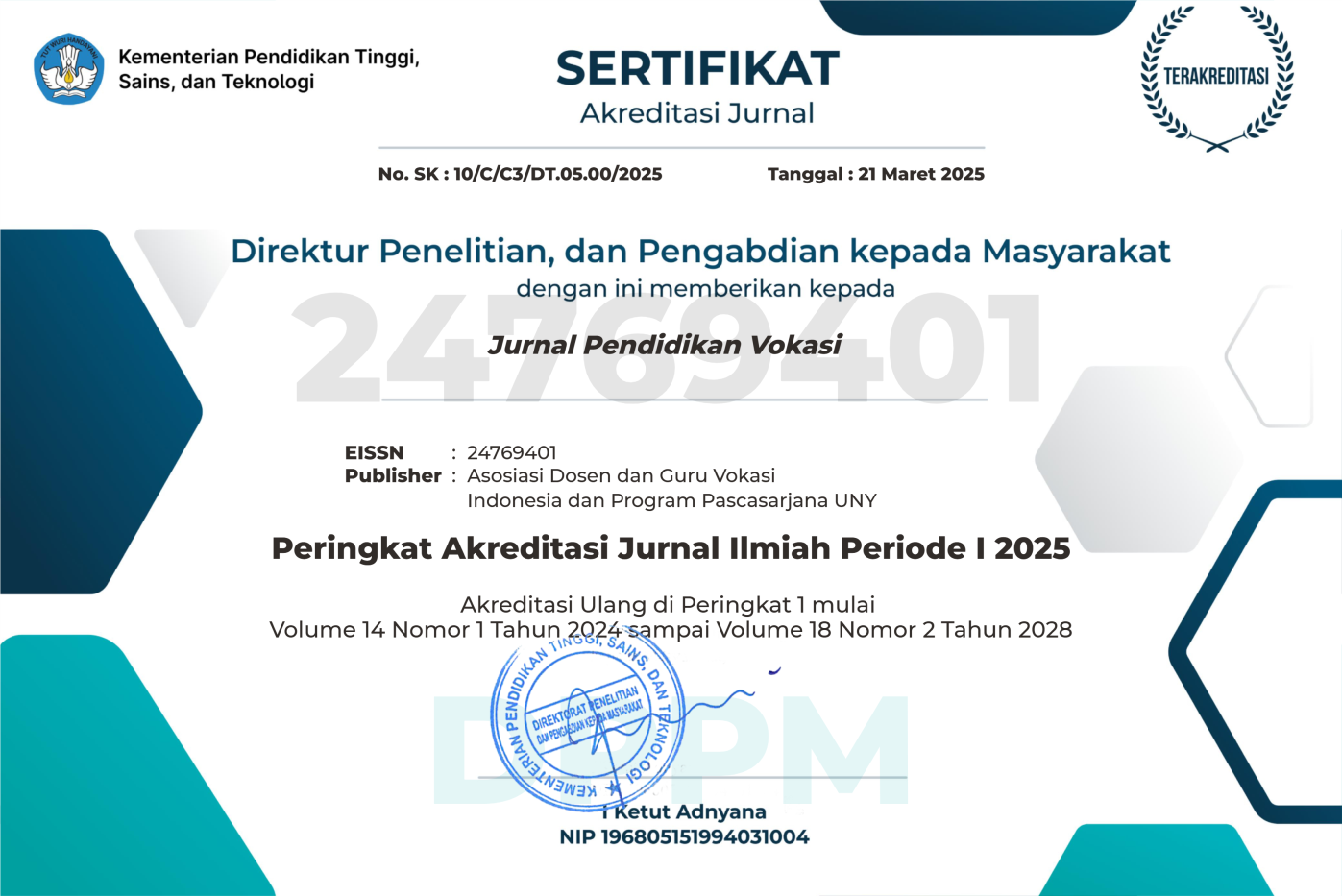The competency-based training model for vocational high school teachers from electrical expertise programs
DOI:
https://doi.org/10.21831/jpv.v8i3.19877Keywords:
training model, vocational high school teachers, competenceAbstract
The study was to generate a valid, practical and effective competence-based training model for the electricity program vocational high school teachers. The type of the study was research and development that referred to the development stages proposed by Plomp. The data gathering instrument for the study consisted of: (1) validation sheet; (2) observation sheet; and (3) response questionnaire for the training participants and the trainers. In order to measure the level of reliability and the level of agreement consistency among the raters, the researcher implemented the Cohen's Kappa coefficient statistics has a minimum value of ≥ 0.70. The subjects of the study were the electricity program vocational high school teachers in the City of Makassar and the Regency of Gowa totaling 22 people. The results of the study were as follows: (1) the training model had fulfilled the criteria of validity so that the model might be implemented for the training activities of electricity program vocational high school teachers; (2) the training model had fulfilled the criteria of practicality that were measured from the level of model stage (syntax) implementation; (3) the training model had fulfilled the criteria of effectiveness that had the following indicators: (a) the level of knowledge and understanding exposed by the training participants, (b) the level of teaching skills exposed by the training participants, (c) the quality of training participants' portfolio and (d) the response of the training participants and the trainers.
References
Azwar, S. (2013). Tes prestasi fungsi dan pengembangan pengukuran prestasi belajar. Yogyakarta: Pustaka Pelajar.
Djojonegoro, W. (1998). Pengembangan sumber daya manusia melalui sekolah menengah kejuruan (SMK). Jakarta: Jayakarta Agung Offset.
Fakhra, A., & Mahar, M. S. A. (2014). Impact of training on teachers competencies at higher education level in Pakistan. Journal of Arts, Science & Commerce, V(1), 121–128.
Finch, C. R., & Crunkilton, J. R. (1999). Curriculum development in vocational and technical education: planning, content, and implementation (5th ed.). Boston: Allyn and Bacon.
Ndraha, T. (1999). Pengantar teori pengembangan sumber daya manusia. Jakarta: PT. Rineka Cipta.
Nitko, A. J., & Brookhart, S. M. (2007). Educational assessment of students. New Jersey: Pearson Education.
Noe, R. A. (2008). Employee training & development (4th ed.). New York: McGraw-Hill.
Norton, R. E. (2008). DACUM handbook (3rd ed.). Columbus: The Ohio State University.
Phillips, J. J. (1991). Handbook of training evaluation and measurement methods (2nd ed.). Houston: Gulf Publishing Company.
Plomp, T. (1997). Educational & training systems design. Enschede: University of Twente Faculty of Educational Science and Technology Enschede.
Presiden Republik Indonesia. Undang-Undang Republik Indonesia nomor 20 tahun 2003 tentang sistem pendidikan nasional (2003). Indonesia.
Presiden Republik Indonesia. Undang-Undang No. 14 Tahun 2005 tentang Guru dan Dosen (2005). Jakarta.
Pugach, M. (2006). Because teaching matters. New York: John Willey & Sons Inc.
Rusman. (2011). Model-model pembelajaran mengembangkan profesionalisme guru. Jakarta: PT. RajaGrafimdo Persada.
Soenarto. (2014). Kebijakan pengembangan profesi guru. In Pendidikan dan Latihan Profesi Guru Program Keahlian Teknik Komputer dan Jaringan, di Balai Diklat Depsos Purwomartani, Kalasan, Sleman, Yogyakarta.
Susatya, E. (2013). Pengembangan model pelatihan guru sekolah menengah kejuruan kelompok seni dan budaya. Jurnal Pendidikan Dan Kebudayaan, 19(1), 107–122.
Thompson, J. F. (1973). Foundations of vocational education social and philosophical concepts. Madison: Prentice-Hall, Inc. Englewood Cliffs.Downloads
Published
How to Cite
Issue
Section
Citation Check
License
The authors submitting a manuscript to this journal agree that, if accepted for publication, copyright publishing of the submission shall be assigned to Jurnal Pendidikan Vokasi. However, even though the journal asks for a copyright transfer, the authors retain (or are granted back) significant scholarly rights.
The copyright transfer agreement form can be downloaded here: [JPV Copyright Transfer Agreement Form]
The copyright form should be signed originally and sent to the Editorial Office through email to jpvokasi@uny.ac.id
Jurnal Pendidikan Vokasi by http://journal.uny.ac.id/index.php/jpv is licensed under a Creative Commons Attribution-ShareAlike 4.0 International License.












